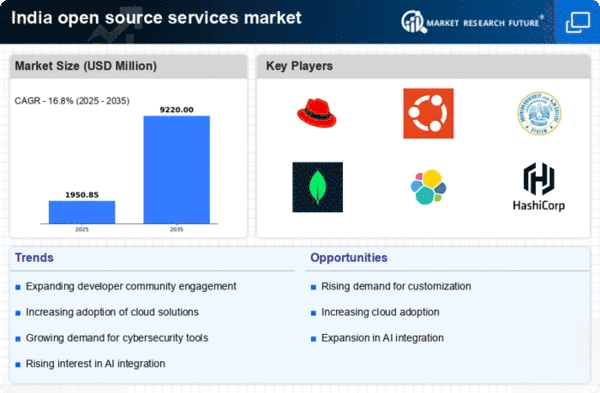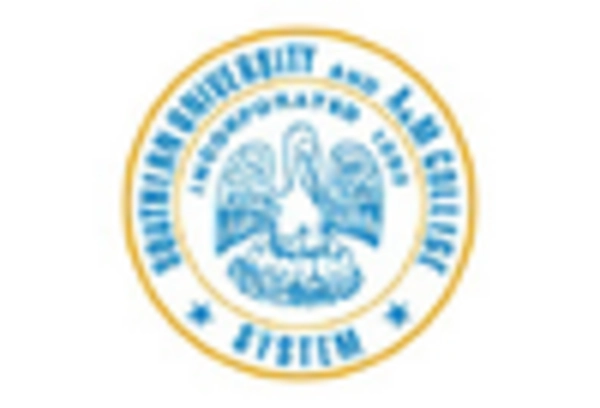Emergence of Hybrid Solutions
The emergence of hybrid solutions is becoming a defining characteristic of the open source-services market in India. Organizations are increasingly adopting a blend of open source and proprietary technologies to leverage the strengths of both approaches. This trend is driven by the need for flexibility and scalability in IT infrastructure. Hybrid solutions allow businesses to customize their technology stack while benefiting from the reliability of established proprietary systems. Recent market analysis suggests that hybrid solutions could capture up to 35% of the open source-services market by 2026. This shift indicates a growing recognition of the importance of adaptability in a rapidly changing technological landscape, positioning hybrid solutions as a key driver of market growth.
Growing Demand for Customization
The open source-services market in India is experiencing a notable surge in demand for customization. Businesses are increasingly seeking tailored solutions that align with their specific operational needs. This trend is driven by the recognition that one-size-fits-all approaches often fall short in addressing unique challenges. As a result, service providers are focusing on developing customizable open source solutions, which can be adapted to various industries. According to recent data, the customization segment is projected to grow by approximately 25% annually, reflecting the market's shift towards personalized services. This growing demand for customization is likely to enhance the competitive landscape of the open source-services market, as companies strive to differentiate themselves through unique offerings.
Increased Focus on Cost Efficiency
Cost efficiency remains a pivotal driver in the open source-services market in India. Organizations are increasingly turning to open source solutions as a means to reduce operational costs while maintaining high-quality services. The absence of licensing fees associated with proprietary software allows businesses to allocate resources more effectively. Recent statistics indicate that companies utilizing open source services can save up to 30% on software-related expenses. This financial advantage is particularly appealing to small and medium-sized enterprises (SMEs) that are looking to optimize their budgets. As the emphasis on cost efficiency continues to grow, the open source-services market is likely to expand, attracting a broader range of clients seeking affordable yet robust solutions.
Expansion of Educational Initiatives
The expansion of educational initiatives is playing a crucial role in shaping the open source-services market in India. As awareness of open source technologies increases, educational institutions are incorporating open source principles into their curricula. This focus on education is fostering a new generation of developers who are well-versed in open source methodologies. Recent reports indicate that over 60% of technical institutions in India have integrated open source training programs. This educational push is likely to enhance the talent pool available to the open source-services market, driving innovation and adoption. As more skilled professionals enter the workforce, the market is expected to experience accelerated growth, further solidifying the importance of education in the open source ecosystem.
Rising Interest in Collaborative Development
The open source-services market in India is witnessing a rising interest in collaborative development practices. Organizations are increasingly recognizing the value of community-driven projects, which foster innovation and accelerate the development process. This collaborative approach not only enhances the quality of software but also encourages knowledge sharing among developers. The trend is supported by the growing number of tech communities and forums that facilitate collaboration. As of November 2025, it is estimated that collaborative projects account for nearly 40% of all open source initiatives in the country. This shift towards collaborative development is likely to strengthen the open source-services market, as it promotes a culture of shared responsibility and collective problem-solving.
















